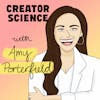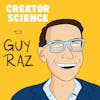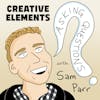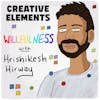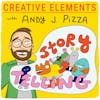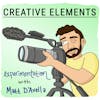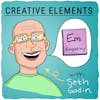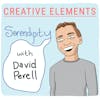
#35: David Perell – How "The Writing Guy" thinks about Twitter, education, and creating your own games
Play EpisodeDavid Perell is a writer, podcaster, and the creator of Write of Passage.
David Perell is a writer, podcaster, and the creator of Write of Passage.
His essays cross between topics like travel, culture, media, marketing, and technology, but focus on our relationship with information – especially how we make sense of the world by consuming ideas.
In this episode we talk about David’s approach to education, quitting institutional games to create your own games, how to use Twitter, and how writing can generate serendipity.
Transcript and show notes can be found here
***
LISTENER SUPPORT
Join our community on Facebook
Support this show through Buy Me A Coffee.
***
SPONSORS
Try Podia and save 15% for life as a Creative Elements listener
Start your free trial of SavvyCal and get your first month free using promo code ELEMENTS
***
ABOUT JAY CLOUSE
Subscribe to my weekly newsletter
Enroll in my course on podcasting, Podcast Like The Pros
***
PODGLOMERATE NETWORK
This show is a part of the Podglomerate network, a company that produces, distributes, and monetizes podcasts. We encourage you to visit the website and sign up for our newsletter for more information about our shows, launches, and events. For more information on how The Podglomerate treats data, please see our Privacy Policy.
Since you're listening to Creative Elements, we'd like to suggest you also try other Podglomerate shows surrounding entrepreneurship, business, and careers like Rocketship.fm and Freelance to Founder.
Learn more about your ad choices. Visit megaphone.fm/adchoices
David Perell 0:00
I've basically failed at every institutional game I've ever played just a full on F like whether it's trying to take standardized tests did horribly on those whether it was trying to get good grades did horribly on those. And I guess at some point I realized that I could use the internet to create my own games and create games that were designed for me to win it them.
Jay Clouse 0:23
Welcome to Creative Elements, a show where we talk to your favorite creators and learn what it takes to make a living from your art and creativity. I'm your host, Jay Clouse. Let's start the show.
Jay Clouse 0:50
Hello, welcome back to another episode of Creative Elements. It's amazing as always to have you here. If you've been following the show for a while, you may have noticed that I have a slight bias towards writers. I'm sorry, I think of myself as a writer. And so I tend to be a little bit skewed in that direction. But don't worry, I'm working on it. And as a quick aside, I love guest recommendations. So if there's someone you want to hear from, tweet at me at Jay Clouse and let me know. But speaking of writing, and speaking of Twitter, today's guest is David Perell. I met David a couple years ago in Columbia, Missouri, while throwing axes at an event called capital camp. But before that serendipitous in person meeting, I have been following him on Twitter. In fact, a lot of people have met David through Twitter, both literally and figuratively.
David Perell 1:38
Yeah, I love Twitter, in terms of what it's given me, it is probably the most important platform in my life. And
Jay Clouse 1:47
Twitter is a really interesting platform. If you haven't really put much time or energy into it, you may think of it as a place where people share really short sort of dull updates about their own life and activities. Some of my early tweets said things like making a sandwich or going to the football game, but Twitter has changed a lot over the last few years. And now it's where I basically get all of my breaking news. It's how I keep up with trends. And it's even how I connect with people for the show. But even still, Twitter is a lot of different things to different people. Oh,
David Perell 2:17
I have a lot of ways to describe it. So I think Twitter first is a library. I think that it's a place where people come together where you can find a bunch of different ideas sort of all in the same space, and you can crawl through these little labyrinths and you can end up in German history, then you can end up in philosophy, then you can end up in art history, then I think it's a conference, a place where you get to choose the speaker's you get to be a speaker and go from being really an attendee to someone who has a small booth and a big booth and your speaker. And then I think that it is sort of like a social club. I mean, most of my friends me through Twitter.
Jay Clouse 3:02
Over the last couple of years, I've been telling myself that I need to take Twitter more seriously. It seems to be a really great platform to get your ideas in front of people. And that is modeled by David better than just about anybody else. In the time that I've been telling myself to take Twitter more seriously. My Twitter following has grown from somewhere around 3000 followers to 4300 followers. Meanwhile, I've seen David's following balloon from somewhere around 40,000 followers to 140,000 followers, he really knows how to stand out on Twitter.
David Perell 3:31
If I were giving advice to someone who is new to the platform, I would say tweet a lot. spend less time consuming Twitter than you think. And actually try to dm and meet the people who you end up creating relationships with. That's really what it's about.
Jay Clouse 3:49
David does a lot more than tweet. He's built quite a name for himself as a writer. In fact, his Twitter bio reads the writing guy in quotes. He has an online school called Write of Passage. That's write with a W. And in Write of Passage. He says you will learn a step by step method for publishing quality content and distributing your ideas to your professional network leading to unexpected opportunities and increased serendipity in your work in life. The course has had students from Google, Facebook, Twitter, Goldman Sachs, Intel, and more. Those students rave about the experience when given the opportunity. And ask what here, the course isn't cheap. It's $4,000 to $6,000 per student. So in this episode, we talk about David's approach to education, quitting institutional games to create your own, how to use Twitter, and how writing can generate serendipity. I'd love to hear your thoughts on this episode. As you listen, you can find me on Twitter or Instagram @jayclouse. And if you haven't joined our private Facebook group yet, I'd love for you to do so now. The link is in the show notes. And now let's talk with David.
David Perell 4:56
Basically, for a couple years, I probably spent 30%, 40% of my waking hours on a golf course. And I was extremely driven to practice and try to improve. And basically, I've, through that experience, I realized something quite peculiar about myself. I'm extremely analytical, and not numbers driven at all. And you don't usually find that. And I think most of the interesting things that you end up learning about yourself or achieving are things that happening in the world kind of come out of these weird idiosyncrasies, in the way that a company is built, a country is founded, or a person's personality comes to the fore. And so I was trying to dissect every aspect of the game, how to play better shoot lower scores, and do it in a very efficient way. And I ended up not being quite talented enough to play at a professional level, which was always my goal. But I ended up studying the physics of how to play golf, I ended up having these very strict rules for myself with how I was going to practice what I was going to do on the driving range ended up working with some coaches studying the my the biomechanics of the golf swing, using military grade launch monitors to measure my, my ball flight. I mean, just crazy things for a high schooler to be doing. And I think that that ended up setting up a lot of this thinking and routines that I now use as a writer.
Jay Clouse 6:28
Yeah, kind of sounds like you had this instinctual interest in like feedback loops, or appreciation of feedback loops to very quickly understand like, well, if I swing this way, or if I hit at this launch angle, here's what happens. Were you out there on your own a lot? Were you like, were you going with like a parent?
David Perell 6:44
No, I'm just out there on my own, I would remember days where I would show up with stars in the sky and leave with stars in the sky. And I was just hanging out there, the club I was at had this great cheeseburger that was delivered in the shape of a hot dog. And it was sort of famous. And so I just crushed those cheeseburgers and try different ways of putting condiments on those cheeseburgers and then spend the rest of the day just playing golf. And I had a couple of friends out there who were professional. And through them, I ended up picking up a lot of the ways that they did things. But ultimately, it was really just me, myself and I out there just alone, sort of like how I like to work, I like to be sort of just work alone. I don't really like working with teams, and I'm very sort of self motivated. And once I sit down to do work, whether it's golf, whether it's I'm now taking tennis really seriously now, or whether it's writing, I really just don't get distracted, I can get into a flow state very fast. And I just love the challenge of competing against myself and relentlessly striving to improve at something. So I ended up playing division one golf my freshman year, and I ended up realizing that I just wasn't quite good enough, which was a really difficult moment in my life and ended up just being very unhealthy next 12 to 18 months. And eventually, I realized that well, I became Sports Director for the local television station for my university. And that was really intense, because we took it really seriously. And every week, we had to produce a five minute live television segment. And then at the same time, I was anchoring a show that aired on ESPN 2 throughout the state of North Carolina. And so this was back when I was a sophomore in college, and there was quite a bit of responsibility that came with that. And I almost got kicked out of my fraternity for really bad grades. Because I got a two, three my freshman year, and I could be worried parents were really worried about me, they wanted to take me out of college. And I guess that sort of through those experiences. I think that one of the big ones was school, I basically failed at every institutional game I've ever played just a full on F like whether it's trying to take standardized tests did horribly on those whether it was trying to get good grades did horribly on those. And I guess at some point, I realized that I could use the internet to create my own games and create games that were designed for me to win at them. And I was so bad at the traditional games, that it actually ended up being advantageous. I sometimes think that the worst thing you can be when it comes to those traditional ways of living life and building careers is mediocre. Because if you're really good at them, well then the red carpet is just laid out for you. I mean, there's quite a bit of competition, but you could go to Harvard Law than you could go to Goldman Sachs and you can sort of work your way up in these very defined paths that you know are going to pay well he can go be a doctor, then if you're really bad at them like me, you're just like, Well, okay, I gotta invent my own games here. But I think that when you're mediocre, you sort of end up in this place. Where you're in these really bitter scenarios of trying to compete for select few spots, and you are so responsive to what everybody else is doing, and just sort of following the path and not really listening to yourself what you want to do how you want to live. And I think those outcomes can be pretty pernicious.
Jay Clouse 10:21
That's a really interesting insight. Because you're right, when you're when you're kind of in the middle of the pack. It's like, what do you do you just keep getting rejected from the things that you're trying to be ambitious and apply at the top of the line for things. You believe in yourself enough in this game that you're going to keep trying. It does sound kind of kind of brutal. I had no idea that you you did, basically journalism sounds like you were, you know, involved in media and coverage. And I spent some time there. And what I walked away with was just a huge respect for deadlines. Because like, you had to have stuff done, and to the editor by this time, or it didn't run in your entire process was wasted. And also your editors pissed. Did you have like a similar experience?
David Perell 11:02
Yeah, I think so. I think that well, I had to go live every Monday. And I remember a lot of those Sunday nights in the editing room. And those editing rooms are like a Vegas casino, where you really don't know what time it is. So it'll be like 4am. And it'll feel like 10, or it'll feel like 10 and actually be 4am. And the only way that we knew what time it was, was we would always go to the sandwich shop across the street, and we would get a milkshake and a sandwich like 12:30 at night, and it was open to one it was called Acorns. And it was delicious. And we'd come back to the editing room. And we were just all kind of in it together. But you know, I think deadlines are her really, I'm very ambivalent about deadlines and ambivalent does not mean which is what I originally thought that you felt sort of wishy washy about something, it means that you are ambivalence. So it's like ambi, like ambidextrous, so you feel both very strongly about the good sides of deadlines, and very strongly about the bad sides of deadlines. And that's how I feel I feel very ambivalent about deadlines. On one hand, I think that being prolific and creating things all the time, is, at least when you get started the thing to do, I think that you want to I mean, I'm in a stretch right now, I've published an article every single day for like the last 45 days, I have a very strict routine and cadence with myself this morning, I didn't feel like writing, I ended up sitting down writing and banging out an article in a couple of hours. And I think that that is really good for your creative spirits. At the same time. I think that there's a convexity to great work in that a lot of the great pieces that have been written a lot of the great concerts that have been sung, artists that have been created, albums that have been created. They were done in a remarkably short amount of time, I was listening to the new logic album yesterday. And he made that whole album in a series of four days. Now there was some time after where he ended up doing a lot of editing. But I think that there's this sort of spark this firework of inspiration that comes out and great work. And that's the problem with deadlines. You don't allow yourself to tap into the convexity of greatness. And I think that the daily production of stuff is really good for building a career on the internet. And I think that it's a great place to start as a creative. I don't know that it's the right place to end. I think that, you know, if you look at someone like Nassim Taleb, he takes a sabbatical every three years or so writes a book, sort of whenever four to eight years, but like doesn't really have strict deadlines. And I think that there's something that's beyond the deadline. And there's also something very inhuman about deadlines. You know, once before the clock was invented, we ended up just I've learned last night, we used to sleep for 11 hours a night. And we used to just do things because we felt like doing them. We're much more qualitative, and the clock has a way of this sort of oppressive hand on the human soul. And it says, No, you will do something now because it is the time to do that, not because you feel like doing it. And I think that that's the downside of deadlines. So I really struggle with that.
Jay Clouse 14:32
Totally. I also feel ambivalent about them. Because the power, the power is like if you trust yourself to know that when I commit to a thing happening, it's going to happen, like that's power. And so with that power, I think comes the decision in the discernment of when do I impose a deadline on myself or not? I feel like that's the that's the kind of gray area in the game that you got to play with yourself if you're feeling this ambivalence. When we come back, we dive deep into David's journey with Twitter and what he's learned along the way. Right after this Welcome back. David has made quite a name for himself over the last few years as the writing guy. But up to this point, we haven't really talked much about writing. So I asked David when he became interested in writing.
David Perell 15:16
That was, well, after college, I mean I was a horrible writer growing up just atrocious, embarrassingly. So even when I was working, a lot of the feedback was, hey, you're not a great writer. And I think that the realization that writing could be so transformative as a medium and as a ritual, that far proceeded my ability to write well. And so that ended up happening a couple years after I graduated from college, I began to write and write and then cool things happened. And then sort of like you what you were saying earlier, you get on these feedback loops, where good things begin to happen, you try to get better at it. And with writing now, I've I've developed a lot of those same analytical ways of thinking about things. I mean, I've developed a whole system for how to think about writing, and everyday just come up with one new idea of Okay, what is something that we can think about to write better. So today, I came up with an idea called the three deadly sins of writing. And it's funny, you just make them up, and then they start becoming words that people use. And so those are weak, wasted and redundant words. Yesterday was like the personal monopoly investor that I was talking about the paradox of abundance last night, I have a no card right in front of me called lateral thinking with withered ideas, like, there's just my whole room is filled with no cards of just different ideas, with new ways of thinking about writing, that are hopefully fresh, and that are very empowering. There's a line from James Clear, and he says something along the lines of simple ideas make it easy to execute. And I've always thought that he was very right about that about simple ideas is sort of what you need when it comes to actually creating something. And so I try to just make my writing and the rules that I use very simple. I think that compared to books like Strunk and White and a lot of the other writing classics, the way I think about writing is just a lot more simple.
Jay Clouse 17:15
David has embodied these simple rules of writing through his Twitter account. One of his most popular tweets reads, business writing 101. Shorten your sentences, make your point fast, shorten the introduction, use simple words. Add graphs and statistics. No buzzwords, use more periods, fewer commas. Right for skimming, not deep reading, bold, the main takeaways. Writing has had a huge impact on David's life. In fact, David wrote in an essay, quote, writing is the best kind of networking. By making it easy for people to find you online, you'll create a vehicle for serendipity. It's pretty obvious that writing on Twitter has been a huge vehicle of serendipity for David. So I wanted to talk about that journey.
David Perell 18:02
So I signed up for the first time on Twitter in 2011. My friend, Avi Stricker, my junior year of high school said, Hey, you got to get on this platform, I got on thought it was there was nothing to it. And honestly, I was probably right. Twitter in the early days was really kind of a mess. It wasn't good. There was no engagement. When you did write a tweet, the syntax was really weird. And then I got on Twitter again in about 2014. And it was quite a different platform. It's changed a lot more since then. So the the rate of change on Twitter's been a compounding curve. And I remember following Marc Andreessen, who is a venture capitalist in Silicon Valley. And he's brilliant. And I remember having this sensation of sitting on my bed in college after spending the day in these atrociously boring lectures, just delivered by people who weren't subject matter experts, and who were giving me the world's best education for 1995. And it was 20 years outdated. And I remember going to those lectures just saying, the world that they think we're living in, doesn't exist anymore, and opening up twitter and having at the speed of light, ideas transmitted from marks fingertips, across cables that had been laid around the world and into my hands and straight into my brain, and to have space and time collapse like that and to realize, at a very philosophical level, how transformative that was and what that would mean for the future of idea creation, knowledge management in our lives as humans made me Say, wow, this is happening on Twitter. And where I was living in a town of 5000 people. This was basically neutralized that disadvantage. And I started applying for internships in New York. My sophomore year, my junior year, I was getting them through Twitter. And I realized that it was what I later discovered to be the real life manifestation of what Marshall McLuhan called the Global Village. Twitter is a lot about how you make it. And the problem with Twitter is that the way that the platform angles you in terms of how you use it is directly, precisely not how you want to use the platform. It tells you to follow celebrities, you don't want to post celebrities, it basically is the cesspool of a civil war of people debating about politics in a way that is so unintelligent, and so high school lunchroom. And what I do is I just mute all of politics, that isn't to say that being politically disengaged is the best way to live as a human being. But it is to say that, if you want to be politically engaged, tweeting back and forth, is just not the way to do it. You can't achieve meaningful progress at 100 and 280 characters. And what I've done is I've said o hell with the celebrities, to hell with the politics, to hell with the rage, to hell with the drama. And I've said, I am going to go find the most interesting people in the world who are thinking about things that other people aren't thinking about, I don't care where they're from, I don't care what they look like, I don't care who they are, I just care that they have interesting ideas. And for me, Twitter is a project of finding those people, building relationships with them, getting to know many of them, and ultimately collaborating on ideas with a lot of them.
Jay Clouse 22:01
So far, when we've talked about this, you've talked a lot about the benefit of following people, learning from people communicating with people. It's also a platform that you've really learned how to create on successfully for yourself. So how do you think about balancing the way that you engage on Twitter amongst those different ways that you can use it, especially between like consumption versus creation?
David Perell 22:21
Yeah, so basically, creation on Twitter is vastly underrated. consumption is overrated. So the goal with Twitter is always to consume less and produce more, that is always a constant struggle, the production part is a constant struggle, because you want to come up with ideas that are both novel and well compressed. So that is where I'll focus on for how to create well on Twitter, and I go over a lot of this in my course called How To Crush It On Twitter. And the novelty aspect is, you want something that feels new, and you want something that feels fresh. And that then basically is what the platform is sort of geared towards people saying, hmm, I've never thought of that before. Hmm, I didn't know that. So that's the first place to be in. And then the second thing is well compressed. And so what you want to do is have a lot of knowledge that is taken into that 280 characters. And that can either be something like a summary, like you read an s one of a company, and then you say, here are all the main highlights in one tweet. Oh, great. Thank you very much. You just saved me 15 minutes of reading that s one. And now I have all the main points. The other way that I think is more interesting, and this is the real art of Twitter is finding something that is generalizable and interesting. And what I mean by that is the thing is the line between this and a fortune cookie is very thin. But this is where a lot of people who are good at Twitter, they they thrive. They have ideas based on experiences based on realizations that they have of just like fundamental ways that the world works. I remember one tweet, I read one time, if the news is fake, imagine history. six words or so. And it's an unbelievably profound idea, an unbelievably profound idea. And I think that that all the time. And I think that that is then what you want to go for that novelty and that compression. And then when it comes to consuming on Twitter, like I said, Get rid of the rage. Get rid of the people who are angry and bitter and cold and ungenerous, and get to a place where you're finding ideas that you wouldn't find elsewhere on the internet. People are very experimental, and I value interestingness on Twitter, as much as I value truth, and I start with that, like what is interesting what is sort of priming my imagination. And what sort of gets my brain going and what begins to create a thread that then I can pull on over time. And ultimately, the algorithm has gotten pretty good in terms of finding interesting ideas, It rewards things that are popular, more than it rewards things that are interesting, which I wish wasn't the case. But Twitter, if you open it a couple times a day, I think it is a real net positive and any more than that it becomes a net negative.
Jay Clouse 25:32
How is your opinion on that changed over time as like you've gotten more successful when you've put a ton of time it seems into Twitter? Do you ever feel like Gosh, I'm spending too much time on Twitter? Yeah, I'll talk more more so than before, all the time,
David Perell 25:48
I'm not sure it's more so than before, it's just that the Twitter itself has become a lot better at hacking your attention. You basically, we live in a world where the smartest people are working to create platforms that create these Pavlovian responses and people that make them addicted to using the platforms. And Twitter is really good at that. And there's little things like the notifications tab always takes a while to load. And when they studied Pavlov it was the actual, the Pavlovian rats, it was the actual uncertainty that created the addiction, once the rats didn't know if they were going to get the sugar or not. That's when it really became addictive. And it was, it's the same thing on Twitter. And also, Twitter has created virality and built it into the platform now in ways that it wasn't there three or four years ago, the spiciest takes the hottest tweets, the ideas that spark a charge out of people are rewarded now because they can spread farther like they didn't used to be. You know, Twitter didn't always have this sorted algorithmic feed. It used to just be chronological. There were people who called themselves Twitter completionist, they would read every single tweet from every single person that they followed. And now who you follow, it just doesn't matter that much. You end up seeing the best tweets sort of no matter who they're from, as long as they're sort of in your circle. It used to be if you didn't follow someone, you didn't see the tweet unless somebody that you followed retweeted that person.
Jay Clouse 27:23
What are the moments you looking back standout? Where you realize, like, Oh, I can really do something on this platform, or people are really starting to pay attention, or I think I figured something out here.
David Perell 27:33
I think that there were a couple. One of the big ones is just how successful Write a Passage has been. And we do all the at least the vast majority of the marketing through Twitter. And that is sort of a constant surprise. The next one is how many people I've met or have recognized me on the streets from Twitter and just realizing that that Twitter's sort of real in a way that is hard to remember. I was in Detroit last summer, and a guy came up to me on the street at night. It was like Thursday night and he comes up he goes, are you David Perell? I was like, Yeah, I was with a friend. And he had been running a podcast about the state of Michigan and I was there to explore the state of Michigan. So he took us out the next day for lunch and ended up showing us the city. And Twitter's an amazing matching tool for people. Like if someone follows me on Twitter, and they know me well enough that they come up to me on the street and they say, Hey, are you David, they're they're almost always awesome. And he ended up showing us what, what Detroit was all about. And then I think that that same thing in terms of being able to reach out to other people, you know, having the ability to have conversations with people on the internet, and then say, hey, let's hang out in person is really cool. I bet I've met 100 200 people through Twitter. By my roommates, I met through Twitter at my last two apartments. And basically all my friends come through Twitter. I mean, it's like a whole, it's like a whole social world for me, because I just put ideas out into the world. And people come back and the people who end up following the people end up engaging end up just being fascinating in the kinds of ways that I would never find fascinating people if I'm just hanging out in the physical world.
Jay Clouse 29:35
If there's somebody listening to the show, who's like, a future Twitter famous creator, is there something that you wish you would have known a couple years ago about what sucks about being in that position that they should be wary of?
David Perell 29:48
It doesn't really suck. It just, I mean, you got to be careful with the things that you say of course, and it's always like sort of jarring when just how many people are out there but now it's amazing. Like it's I'd never want to be actually famous. But having people who know who you are, who share your interests is awesome. And it really makes life a hell of a lot better. You can meet amazing people and have these conversations that that, like I said, you wouldn't be able to have and with most people in physical reality, but in terms of big downsides, there really aren't a lot of them.
Jay Clouse 30:24
After the break, David, and I talk about creating your own games and his online school Write of Passage. So stick around, and we'll be right back. Welcome back to my conversation with David Perell. Earlier in this conversation, David told me that he had failed just about every institutional game that he had ever played. He said that he realized instead of playing other people's games, he'd create his own games that were designed for him to win. So I asked him what those games look like,
David Perell 30:52
I am a very lumpy person in my skill set. So I'm really bad at basically everything, except for coming up with a bunch of creative ideas, and consuming high quality information short of storing and organizing those ideas, and then having a system in my life where then I can turn them into other high quality ideas and share them. So I knew I'm really good at that. And I could play that game forever. And so what I wanted to think about was, how could I have a career where I would basically have my youth be an advantage rather than a disadvantage, have a career where I was paid to learn and communicate ideas as much as possible, and have a career where I would be surrounded by the most interesting people in the world. And my tolerance for boredom is extremely low. Like, I get bored as fast as anyone I've ever met. And so my bar there for interestingness is very high. So I basically wanted those three things. And then I never wanted to work for anyone or ever have a boss. After I got laid off from my first job, I basically said I, I just am not going to be working under authority figure ever. So I had to figure out how to merge those four things together. And, you know, took a little while to figure out what exactly that looked like. But now that I have a school, called Write of Passage, where I teach people to write my incentives are quite aligned in terms of I do better financially, when I write great essays, when I have lots of really interesting conversations. And what I know that I can do sort of disproportionately from from other people's just continue to show up every single day, and be quite distinct, and hopefully high level in my thinking, and just just keep going. And consistency has never been hard for me.
Jay Clouse 33:04
That's not exactly what you're saying. But I've been thinking about this a lot for people getting started, it feels like you kind of need to do this small amount of creative output constantly for a period of time to get people to pay attention. But these bigger projects, like books, or films, or video series, like a lot of people are really drawn to that. And that takes a lot of time in the cave. It's so hard to start there and get any attention.
David Perell 33:29
Yeah, I think that, I mean, sort of what you're saying there is about, it's about the external stuff, like the attention how other people are going to respond. And I'm sort of here Trish trying to get at this sort of internal stuff of what you feel as a creator, and what it takes to do outstanding work. Getting your messages spread is of course very important in there's a saying that first time founders focus on product second time founders focus on distribution. And I think that there's an element of truth in that for writing to that when you first time writers focus on Oh, the quality of the work second type hours focused on distribution, but then I almost think that there's a third time, where then you get back to focusing on the product. And that's sort of where, where I'm really trying to think here of what do you need in order to be the best creative that you can be. And I think that from watching and teaching hundreds of people to write the past 18 months, the problem when people first start out, is they think that every article that they publish is like the biggest deal ever. And they feel these two very polarizing opinions at the same time, which can't possibly both be true and it's hilarious. They, they at once feel like they're going to publish something and everyone is going to watch them and the world is going to descend on them and all of a sudden they're going to be exposed. This fraud because so many hundreds of people are reading their writing. And they realize that you don't actually know anything about the world and that you're actually a really bad thinker. And that you're basically just suck as a human being. So they think that, and then at the same time, they're really mad that no one's reading their writing. And they're like, I'm shouting into crickets of indifference. And I have no readers, and I go on my website, and I had three people in the last month, and this whole reading on the internet thing doesn't work. So both of those things can't be true, but they feel them both. And I think that when you first start just due to the way that you feel like you're under a spotlight, when you first start writing, you just gotta be sort of prolific and go, go, go, go, go sort of get, get your reps in and just feel what works for you. What doesn't, what do you enjoy? What don't you enjoy? But then what I'm grappling with right now is exactly what you said about deadlines? How much of them do I want? What kind of deadlines do I want to set for myself? Are they just production oriented? Sort of on the inputs? Or are they just focused on the outputs? And the jury's still out on that? I suspect it's very dependent on the actual creator.
Jay Clouse 36:10
Totally, it feels like every time you go through a wave of like, Oh, well, I wish I would have known this 12 months ago, because I would have done things differently, you actually still needed to do that thing for 12 months, for you to even have the opportunity to do things differently, or doing it differently and having it be meaningful. You mentioned Write of Passage, and I recently tweeted about, hey, what you guys think about online courses recently, and I got a ton of people saying Write of Passage is amazing. So for somebody who, you know, you said that you you fail these institutional games, and you didn't love college? How have you thought about constructing a Write of Passage to be a different game that helps people in a different way?
David Perell 36:48
Yeah, so I was talking about creating my own games. And I always just one thing with the internet is, it's it's so big, that it really just helps to be opinionated in intelligent ways. And to build the thing that sort of you just wish existed. I hated school. I think school sucks for a lot of people. And it actually is very traumatizing. For a lot of kids in like myself. I think school was such a net net net negative in my life and going to school, those were some of the worst days of my life, I just despised being in a classroom, despise taking tests despise the authority of a teacher, and the way that you had to just sit there and do this performative learning. And what I said was, I was sitting in school, and I remember thinking myself, so many times, I can do something much better than this. And I think Write of Passage is quite a bit of what do I wish existed in a course. And I think a lot about who are the teachers that really influenced me, because everyone gets to know each other and students get to know me, I'm incredibly animated in in Write a Passage, which I think makes it fun, I have a little level of energy that I basically just save for those really special five weeks, the people are fantastic. And then I spend my whole life thinking about different ways to write. And I do all of that. So I can serve my students. And we have 16 live sessions and 33 days, we have four other live writing sessions, where people complete from start to finish an article in two hours. And they say, what, how in the world that I do that. And when it comes to writing communities, there's there's nothing else like it in the world in terms of just the passion and the energy, and the intensity of the experience, you know, I The world is really gone towards a trend of lower and lower standards. And I think that this is one of the sort of, you could say, the, the end result of a world of liberalism, that sort of anything goes you're gonna have low standards, what ends up happening is you get to these places where, you know, it's sort of like online dating, like, it's just fine that where you can just cancel whenever you want, or it's sort of like Airbnb, you can just like, Hey, I don't really feel like coming in three days, it's not an issue. And then even a lot of the online communities like Reddit, you know, you can be in a Reddit subreddit, or you cannot be in a subreddit, but there's no real cost. And I think a lot of the world has just become frictionless to a fault. And so what we tried to do with Write of Passage was rather than making it really easy, we make it really hard. Rather than making it frictionless, we make it friction filled. Rather than making it cheap. We make it really expensive. And we go through all of these paradigm shifts and inversions in terms of how the world works. And you end up with a group of a couple hundred people from 30 to 35. countries who get together and all of them do it so that they can learn how to Right, so they can improve their thinking. So they can build relationships so they can meet like minded people. And teaching that is what I've always wanted to do. Because it what it is what didn't exist in school, is where school was sort of all about the syllabus and telling you exactly what you wanted to do when you needed to do it. Write OF Passage is much more about, hey, you can do whatever. And we're gonna have deadlines for you, but we're not going to punish you. If you don't follow through on them. You're an adult, rather than having hey, here's a diploma at the end know the the success and Write of Passage is, are you able to meet people become a citizen of the internet and continually write after you leave the course. And we have I basically took all the things that I despised about traditional education, flipped them on its head and said, this is how education should be.
Jay Clouse 40:55
Was there anything that you maybe like the first version of Write of Passage or something, something that you thought would work that didn't work?
David Perell 41:03
Yeah, so the first version, what we tried to do was write one really long form essay, and it just was a total flop. So basically, the whole idea in Write of Passage is that the ultimate goal of reading online is ultimately to build a personal monopoly to be the only person who does what you do. And so it's like, Okay, that makes perfect sense. So what we should do is, we should have every student write two articles in the first two weeks. And then because five weeks will, they'll spend the last three weeks writing a 5000 word essay on the topic of their choice. Basically, nobody did it, it was really hard. And I think this gets back to what we were talking about earlier, in terms of the convexity of creativity, where what you need, and what we saw was you produce, produce, produce produce, you go under some kind of strict deadline, you just go through the cycles over and over and over again. And then much later, you write that long form essay, I ended up doing a fellowship, because I wanted to see how it would look to take a group of people and have everyone write long form essays. But yeah, that was a total flop the first time now we just have people focused on reading one article per week. And then what we've ended up doing is every single student gets split up into a group with a student mentor, and all those groups like 20, to 30 people. And within those groups, everyone's helping each other giving each other feedback. And so that's very inspired by when I was going to college, my dad said, paradoxically, in a small environment, you will make more friends. So it's like, oh, you know, go to the University of Wisconsin, Madison, they'll be 50,000 people and make so many friends, that actually wasn't it at all. My dad went to a small liberal arts school. And through that experience, he ended up having incredible friends that he still in touch with 4550 years later, where's my mom ended up going to a big public school. And I just saw that her friends from college weren't quite as strong. And so that's what we've tried to do with those mental groups want to take a big course, and make it small, because that is where meet really meaningful relationships happen.
Jay Clouse 43:08
With Write of Passage and with the writing you do in your newsletter and your podcast, you've started to really diversify the ways that you are creating on the internet. How intentional has that been, versus just wanting to follow your interests?
David Perell 43:17
Honestly, just wanting to follow my interests? I, I'm not that intentional about things. I think that I'm intentional about things in retrospect. So I sort of see what works. And then I codified things, but I always make sure that my intuition is driving the show. And also part of it is just almost like a personal RND of, hey, this or that thing is interesting to me, let me go pursue it. Like right now I'm in a phase where I'm just reading a new article every single day. Well, we'll see if that works. Now, there's these principles that I do absolutely follow, such as, I want people to cross what I call the public to private bridge, where people find me on public platforms like YouTube, like Twitter, and then I want them to come into my private platforms, my website, my email list, in particular, that's very deliberate. So there are certain things that are at the nucleus of what I'm doing as a creator. But on top of that, I think being too stern in terms of strict with how your hands are on the wheel ends up destroying a lot of the fun of life, the serendipity of it, and the unpredictability of creativity. You know, George Gilder who wrote about economics and money and sort of libertarianism. He ended up in a book called, I think it was knowledge and power or something. And he ended up saying that creativity is surprise, and I really liked that definition, where that comes from Claude Shannon information theory and 1948 when he came up with his seminal paper on information theory, which is the conceptual underpinnings of how you're listening to this public Cast right now in terms of how bits move through time and space, and can actually travel to another place. All of that comes from information theory. And what he felt and noticed was that if something wasn't surprising, it was redundant, because you already knew that thing. And so Gilder basically took this idea on top of that, and ended up saying that all creativity is surprise, if you knew where it was going, then it wouldn't be creativity. And so I think that a lot of what it means to be a creator is to balance this arrogance with knowing that you are going to continually create and that is going to lead to great outcomes over time. And to have this Silicon Valley esque founder dogged belief in the project that you're working on. But then a humility to say, Look, I don't know what I'm going to write about. Sometimes, I don't know what's actually going to come out of me once I try to write. And to get back to a place that I think we need to as humans to you know, the original word of the root to the word genius is Genie people in ancient times, they had this mysticism and this understanding that creativity was unpredictable, that it's sometimes came from nowhere. And if you look for too many answers, or at least the wrong answers, you end up constraining your own creativity, I think that you want rigidity in certain parts of the system so that you can have looseness and other parts of the system.
Jay Clouse 46:35
Outside of Twitter, what is your media diet, like?
David Perell 46:38
A lot of books, a lot of books, so I don't consume. I don't read that much. I read surprisingly little. But I basically a couple months ago, stopped reading about business, stop listening to podcasts about business, so almost nothing about business, just about philosophy. And I'm really interested in religion, I'm really interested in, in sort of soul and spirituality, I'm really interested in creativity. I am interested in sort of financial markets and economics. But that isn't like I'm so uninterested in like, what this company is doing, or what that company is doing, and just trying to get much more timeless. I think that that's really what I go for, like, what are these sort of timeless ideas that will be as relevant in 50 years, 100 years, 200 years as they are today. I think that's really what I go for. And whether they're from tweets from articles from books, that's, I'm sort of indifferent to that couple recommendations I have, I really recommend the browser, it's a newsletter that you can subscribe to that sends five amazing links every single day. And it's just fantastic. I mean, there's no other way to put it in terms of the way that it sort of stretches your imagination, then just looking for books that come highly recommended from a small group of people, but are virtually unknown. In the wider world. There's a book called How to take smart notes that's very high on that list. I think the work of Ivan Ilitch is very high on that list, and just always looking for creators like that. And I mean, even last night about a book that was about the shift from thinking how humans used to think of the world qualitatively and quantitatively and how that shifted between about 1250 and 1600. I was like, someone recommended that so it was fantastic book, I'd never heard of it. I was like, Yes, I buy that book. And so I think a lot on on that wavelength. And then also, I think that a lot of media consumption is just hanging out with really smart people and always trying to push the limits on that. I haven't found the diminishing returns to hang out with brilliant people. I think that that is sort of the head of the snake for everything else that's slithers behind it.
Jay Clouse 48:59
Do you think you'll write a book?
David Perell 49:01
Yeah, for sure.
Jay Clouse 49:02
You have any idea what the subject matter will be? No idea.
David Perell 49:05
I'll write it for sure when the time is right.
Jay Clouse 49:14
Well, as if I wasn't already beating myself up for not spending more time writing on Twitter. Now I definitely am. It's hard to not be inspired by David's story. Here's a guy running a very popular online school, yet he hated traditional education. Here's a guy who was laid off from his last job, and now makes a great living as a full time creator. Here's a guy who was told for years that his writing wasn't very good. And here he is being paid by a lot of people to teach them to write. He's a perfect example of what is possible as a creator online. If you believe in yourself, put in a ton of work and go for it. You can follow David on twitter at David_Perell one R two L's or his website Perell.com. Links to that as well as Write of passage are in the show notes Thanks to David for being on the show. Thank you to Emily Clouse for making the artwork for this episode. Thanks to Nathan Todhunter for mixing the show and Brian Skeel for creating our music. If you like this episode, you can tweet at me @JayClouse and let me know. And if you really want to say thank you, please leave a review on Apple podcasts. Thanks for listening, and I'll talk to you next week.
Most Popular Episodes
New to the show? Check out some of our most popular episodes.






